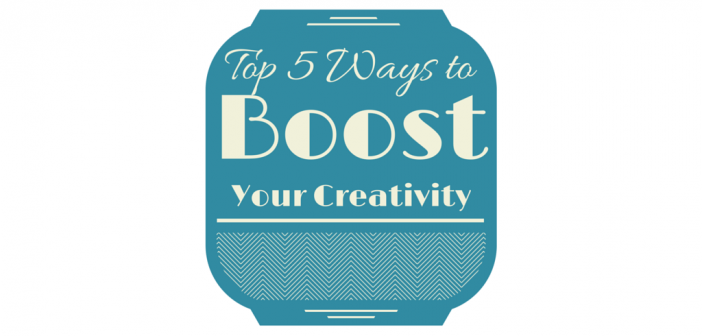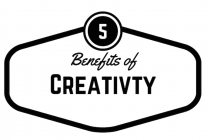One of the biggest challenges when it comes to creativity, is how we can be more creative, or come up with better ideas. Luckily, there has been a lot of good research recently on the subject. Here are five great ways to boost your creativity.
1. Humor
Who doesn’t like to laugh? Even during work hours sometimes, the temptation to sneak in a few funny YouTube videos can get the best of us. Well there’s good news for anyone taking time out for a good laugh. It turns out that humor may help you in being more creative.
According to Stanford professor Tina Seelig, in her book InGenius, funny people have mastered the art of turning off the part of their brains that inhibit creativity. This allows their ideas to flow more smoothly which unleashes their imagination. She’s explains, “that this is why humor is such a benefit to the creative process.”
During the study, researchers asked jazz musicians to improvise while fMRI monitored their brain activity. As they played the music, the region of the frontal lobe associated with judgment went quiet. “This shows that while self-‐‑monitoring is often useful—you don’t want to say everything that passes through your mind—it can get in the way of new ideas.”
Thus, while finding the humor, we’re putting ourselves in a more creative state of mind.
2. Reading
“Some books leave us free and some books make us free.” ~ Ralph Waldo Emerson
There are numerous benefits to reading. Research has shown that among them, reading is an effective way to reduce stress, increase concentration and stimulate creativity. While reading, the mind is able to concentrate and escape into a literary world that eases the tensions in the rest of the body. A recent study showed that reading for as little as 6 minutes will slow your heart rate and ease tension in your muscles.
The study indicated that this is “more than merely a distraction but an active engaging of the imagination as the words on the printed page stimulate your creativity and cause you to enter what is essentially an altered state of consciousness.” This state of mind is very conducive to the creative process.

Reading also increases your knowledge base and provides you with a rich tapestry of ideas to tap into. It gives us a window into ancient civilizations, future worlds, historical figures and all the most creative ideas of great thinkers such as authors, artists, and scientists from all different generations.
“Writing is perhaps the greatest of human inventions, binding together people who never knew each other, citizens of distant epochs. Books break the shackles of time. A book is proof that humans are capable of working magic.” ~ Carl Sagan
3. Travel
Now, more than ever before, world travel is very possible. Thanks to the internet, there are unlimited resources for would-‐‑be travelers, from cheap airfare and accommodations, to discovering new adventures in exotic places. If you’re looking to be more creative, this is good news for you.
Psychologists and neuroscientists recently discovered that traveling abroad has the potential to affect positive mental change. Since creativity encourages neuroplasticity, the neural pathways are rewired by new environments and habits: “New sounds, smells, language, tastes, sensations, and sights spark different synapses in the brain and may have the potential to revitalize the mind.”
“Foreign experiences increase both cognitive flexibility and depth of thought, the ability to make deep connections between disparate forms,” says Adam Galinsky, professor at Columbia Business School and the author of a number of studies on the connection between creativity and international travel.
Being able to jump between different ideas -‐‑ cognitive flexibility – is a key component of creativity. “But it’s not just about being abroad,” Galinsky says: “The key, critical process is multicultural engagement, immersion, and adaptation. Someone who lives abroad and doesn’t engage with the local culture will likely get less of a creative boost than someone who travels abroad and really engages in the local environment.”
4. Meditation
If you’re looking for a way to get the ideas flowing, you may want to try tapping directly into your best creative thinking brain: the neocortex. Meditation is a great way to make this connection.
Mindfulness meditation improves creativity on several fronts. It reduces the reactivity of the reptilian brain, stimulates the neocortex, increase resilience, and improve emotional intelligence. A win win win situation.
Studies have been conducted to examine the cognitive rigidity of people who meditate, and their ability to solve problems in new ways. Scientist found that non-‐‑ meditators have a greater cognitive rigidity than those who meditate on a regular basis, and they also tend to apply outdated, less effective solutions to easy problems based on previous experiences. Regular meditators, however, were better at finding novel solutions to problems.
5. Sex
According to a study done by Newcastle University psychologists, professionals such as writers, artists and people in other creative fields, have twice the amount of sexual partners than other people. The study also found that when creative contribution from an individual increase, so does the number of sexual partners they have. According to researcher Daniel Nettle, creative people are often considered to be very alluring and therefore receive a lot of attention as a result.
The study also found that a higher percentage of people who historically been considered to be geniuses also had higher than average active sex lives. These included artists, poets and other creative types such as Pablo Picasso, Lord Byron and Dylan. So not only does the quantity of creativity increase, the quality also goes up with an increase in sexual activity.




